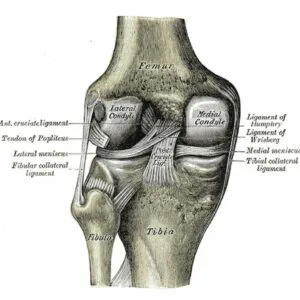The posterior cruciate ligament (PCL) is the strongest ligament in the knee joint. The role of the PCL is to prevent the tibia from moving backward relative to the femur. Injuries to the PCL often occur with other knee structures (ligaments, meniscus) while infrequently occurring in isolation. PCL injury alone accounts for approximately 2 per 100,000 people annually.
Symptoms of PCL Injury
- Sharp or dull pain that is usually located on the back of the knee. Pain may also develop on the front of the knee
- Swelling
- Stiffness may occur which could be caused by the swelling.
- There may be difficulty with knee flexibility which may result in trouble going up and down the stairs
- Knee instability and weight-bearing difficulty
- There may be some radiating pain in the back of the lower leg.
Types of PCL Injuries
Grade I – Minor or minimal damage due to extra stretching of the ligament.
Grade 2 – Some instability and ligament is partially torn
Grade 3 – Knee instability and the ligament is torn
Grade 4 – The most severe form and the ligament is completely torn. Other ligaments may also be damaged.
Cause of PCL injuries
- Car accidents
- Falls especially when the knee is bent
- Direct impact or blow to the shin bone during sports
Posterior Cruciate ligament joint Injury is more common in people who relate to the following:
- Athletes who participate in sports such as basketball, soccer, skiing, and football
- Construction workers, manual laborers, and agricultural workers
- Women are more at risk because of the anatomical and biomechanical differences
If you have any type of knee injury, contact us to book an appointment with one of our Physiotherapists today!
Our More Locations
Physiotherapy Etobicoke | Physiotherapy Oakville | Physiotherapy North York | Physiotherapy Toronto | Physiotherapy Lawrence Park | Physiotherapy Mississauga | Physiotherapy Queens Quay | Physiotherapy Mississauga Erin Mills | Physiotherapy Liberty Village




